- Home
- Jess Foley
No Wings to Fly Page 9
No Wings to Fly Read online
Page 9
Held in his dark glance, she wanted to say Oh, I know what you mean! For she did. It was becoming clear to her; now she was realising it, facing it. Over the past few years she had got a glad eye from several youths in Compton Wells and Whitton or on her trips into Corster. In Whitton the postman’s assistant had winked at her, as had the butcher boy, and the baker’s boy – and there were times when she had acknowledged that they were handsome, these young men, and vital, and charming. But it had gone no further. She had taken their winks and their sweet or saucy comments, and for moments perhaps they had brought a little thrill, but then she had let them go. But not now. Not with this young man. This Joel.
There’s none like you, Lily, he had said, and his words repeated over and over in her brain. And whereas in the past she would have answered a wink, an approach, with deliberate silence or a witty retort, now she could only sit with her heart beating against her ribs, feeling herself held in the spell of his gaze, and the echo of his words.
The band was playing ‘In Amsterdam Where the Tulips Grow’. Lily lowered her eyes from Joel’s gaze and looked down again at the sketch. After a moment she turned the pages back, looking once more at the sketches she had seen. There was the one of the young woman, Simone.
‘She really is very pretty,’ Lily said, ‘and very elegant too.’
‘Oh, yes,’ Joel said. ‘Elegant indeed.’
‘And you say she’s a cousin of yours.’
‘Second cousin, yes.’ He paused. ‘I think there were expectations that she’d become even closer in the family.’
‘What d’you mean?’
‘There were hopes – between my father and her parents, that she and my brother might eventually marry.’
‘And it’s not going to happen?’
‘No, I wouldn’t think so. The idea was just in our parents’ heads. I guess they rather harboured a wish of the families becoming even closer. Cementing the business ties, and the blood ties, and their very strong friendship.’
Lily nodded, and looked down at the drawing again. ‘Well, if your brother did fall in love with her, I could understand it. She’s really pretty.’
Suddenly a dog came bounding, leaping between them, so that Lily sat back with a little exclamation of surprise. The dog, a golden retriever, dashed on, a young boy in pursuit. Lily and Joel followed them with their gaze for a moment, then Lily glanced further off and said, ‘The music – it’s stopped. Ah – shame.’
Joel took his watch from his waistcoat pocket, and said, ‘It’s after five. They’ve finished for now I should reckon.’
A gentle commotion had started up some little distance from the bandstand, and Joel said, looking over, ‘Something’s going on, though.’ And then, a moment later: ‘It’s Punch and Judy, look.’
Lily turned and looked over and saw that a little crowd – many children among them – had gathered in front of a small booth with cheap-looking crimson and gold hangings.
‘We should go and have a look,’ Joel said. ‘What d’you think?’
‘Oh, yes, I think so.’
They stood, picking up their things, and made their way across the grass to the crowd of adults and children gathered before the booth, and there Joel once more laid down his jacket for Lily to sit upon. He sat down beside her. The show was about to begin, and the air around them was filled with the murmur of excited, expectant children. The puppeteer appeared, a wiry, round-shouldered, shabby-looking man who went around to the back of the small booth and quickly disappeared from view. Another few minutes and the show began.
Lily was almost as caught up in the melodrama as the children who sat open-mouthed and wide-eyed, all of them spellbound, and shocked, but fascinated by the hook-nosed, hunchbacked Mr Punch who, in his jester’s motley, carried out his outrageous acts, dealing with a crocodile, a dog, a doctor and other challenges, each of his triumphs met with his famous cry of, ‘That’s the way to do it!’ They watched as he strangled his baby, then bludgeoned his wife Judy to death; were horrified as he tossed their bodies out into the street and then fled from the arms of the law. And how shocking it was that he got away with his dreadful deeds scot-free – how shocking and delightful for every member of the crowd.
The instant the show was over, and while the applause was still ringing out, the puppeteer’s assistant came among the crowd with his hat held out, and pennies and halfpennies and farthings were dropped into it. The crowd began then to disperse. As Lily and Joel rose, a child walked by eating from a piece of sausage wrapped in paper. Joel said to Lily, ‘Did you eat luncheon today?’
‘Yes. I had a little. Not much. I wasn’t hungry.’
‘Would you like something now? Would you like to go for some tea and a piece of cake?’
‘Well – certainly some tea or coffee would be nice.’
He gestured off. ‘There’s a coffee house on the other side of the park.’
‘Oh, yes, but – oh, but it’s sure to be so crowded.’
‘Well, then – we’ll go somewhere else.’ He paused. ‘Let’s get away from here, shall we? Let’s get right away.’ His face was bright. ‘Shall we?’
‘Where to?’
‘I know an inn. Just outside the town – at Lettington. It’s a nice little place. We can get an omnibus part of the way and then walk. It won’t be that far. What d’you say?’
She hesitated, uncertain. She had never entered any kind of inn or public house in her life, and the imminent prospect of doing so brought a little thrill of apprehension.
‘We can walk through the fields,’ Joel said. ‘Come on – summer won’t last for ever.
She hesitated still. ‘I mustn’t be too late getting back.’
‘You won’t be late. We’ve got plenty of time.’ He waited. ‘Well?’
She nodded. ‘Yes, all right.’
‘Good.’ His smile broadened to a grin, and he stooped and swept up his jacket. ‘Shall we go?’
Outside the park they boarded an omnibus which took them to the edge of the town. There they alighted, and walked down a tree-lined lane that ended with a stile. On the right, at the end of a track, stood an old barn, and beyond it outhouses and a farmhouse. Somewhere off among the farm buildings a dog barked. Joel climbed the stile and then gave Lily his hand to help her over. She stepped down on the other side with her hand in his, and so it remained for a moment until he released her.
Side by side she and Joel walked along a narrow footpath that threaded through a meadow. It was all new to her, this part of the country. On either side the grass was tall, soon to fall to the haymaker’s scythe. Birds sang in the hedgerows, over which the butterflies danced, and the blackberries ripened on the vines. From a distant church a clock struck six. There was no one else in sight, and it seemed to Lily that she and Joel might have been alone in the world.
Reaching the far side of the field they passed over a second stile, walked through an adjoining meadow to a third, and then found themselves on the edge of the village of Lettington. Another hundred yards into the main street and there before them on a corner was the old inn, the Moon and Anchor, with its decorative sign hanging above the door. A minute later they had passed into a small flagged entrance hall and Joel was opening the door to the private bar.
A little nervously, Lily followed him in. The hour was still early, and there was no one else in the room. They sat on a faded, padded bench at a dark-wood table beneath a patterned window, and almost immediately a young girl in an apron came from an adjoining room and asked what they would have.
‘What will you drink?’ Joel said to Lily. ‘I shall have some beer. Will you have some tea or coffee, or perhaps a lemonade?’
‘Lemonade,’ Lily said. Lemonade sounded safe enough. ‘A lemonade would be nice.’
When the girl had gone away Lily had a chance to take in her surroundings. The beams of the low ceiling were hung here and there with old fishing nets and other nautical artefacts. There was a ship-in-a-bottle above the door, while on other p
arts of the walls hung tinted engravings of seascapes and majestic schooners. Onto the peaceful scene the early evening sunlight was filtered through the window’s coloured glass. From the open door through which the maid had gone came the murmur of voices from customers in the adjoining bar. Everything appeared so normal and unthreatening. Having heard stories of the loose living and scandalous behaviour that were bred in such places as taverns and public houses, Lily could now only wonder at them with a sense of growing relief.
The maid came back soon afterwards with their drinks. Would there be anything else? she asked Joel.
Joel looked at Lily. ‘You know, I’m hungry as the devil,’ he said. ‘I’ve had practically nothing since breakfast. Could you eat something?’ When she hesitated, he said, ‘Come on, just a little something. Keep me company. You told me yourself you’ve eaten very little today.’ Turning to the girl, he said, ‘Could we see the slate, please?’
The maid went away and came back immediately with a slate listing the bill of fare, and after brief consultations with Lily, Joel gave the girl their order.
After she had gone away once more, Joel lifted his glass of beer. ‘Well – here’s to us, Lily – right?’
‘Yes,’ Lily said, ‘yes,’ and raised her lemonade glass.
The time passed, and they talked, and talked. The food came, and they ate, and the hot, delicious venison pie cooled on their plates a little as they talked. Had they stopped to think, it might have seemed that there was not enough time in the world for all they had to say, but no such question entered their minds as the minutes flew by. Joel spoke of his interests, his passions. He told her of his visits to great cities, to London and Bath, to Munich and Brussels, and of his more numerous trips to Paris. He spoke with wonder of the treasures and sights he had seen there. While in Paris he had visited the Louvre Museum; he had walked down the Champs-Elysees, and had stood on the spot where Marie Antoinette and Louis XVI had died on the guillotine. He told also of theatres he had visited, and concert halls. Sometimes, he said, in the concert halls there might be up to a hundred musicians. He had seen operas by Bellini, and Meyerbeer and Rossini, and ballets too, and some of them were breathtaking. He spoke of one particular opera. The scenery was incredible, so spectacular it took your breath away. The performers were dressed in the most fabulous costumes, and not only were there the most wonderful singers on stage, but there were tumblers and acrobats as well, and more dancers than you could count, and even horses. Lily sat listening, soaking up every word.
Moving to more prosaic subjects, Joel spoke of his work in his father’s department stores, and of his family. He did not only speak of himself and his interests, though; he was full of curiosity about Lily. He wanted to know ever more about her, and asked many questions. In answering him, she found herself opening to him, telling him of ideas and feelings that she had thought never to divulge.
As they talked together, and sometimes laughed, a few other patrons came and went about the place, but Lily and Joel were barely aware of them. Inexorably, however, the time flew, and Lily remarked with a sigh that the light through the coloured glass was changing. ‘What is the time?’ she asked, and Joel consulted his watch and told her it was almost seven-thirty. They must go, she said.
When Joel had paid the bill they got up from their seats and left the cosy little room with its occupants sitting over their drinks, and went out into the soft air of the late-August evening. Lily was sorry to leave the place behind. Stepping out onto the road, they realised that the changing light had not only signified the dying of the day, but also the gathering of clouds. ‘We’re going to get some rain,’ Joel observed, looking up at the sky, ‘but I reckon it’ll hold off for a while.’
At the edge of the village, they came to the first stile, and Joel took Lily’s hand and helped her over. On the other side, on the stony path, he released her hand but lifted his elbow, and after the briefest hesitation she slipped her hand through the crook of his arm. And so they continued through the meadow, and all the while she was aware of his nearness.
Another stile to traverse, and then they were in the second meadow. Before them the path wound on, and all through the time of their walk the sky above grew ever more dark and threatening. The promised rain could not be long in coming.
It came on as they were halfway along the path. From the dark grey, heavy clouds the rain began to fall, just a spattering of individual spots at first, and then with swiftly increasing intensity.
In a second, Joel’s hand took hers, and together they ran along the path, faces bent against the force of the rain. The last stile was there before them, and they were quickly over. On the left lay the track leading to the old barn and the other farm buildings beyond. ‘We’ll get shelter there,’ Joel said urgently, and together, hand in hand, they turned from the road and started up the track.
They reached the barn’s entrance in less than a minute, and found the old door cracked open. The frame offered no shelter, and Joel did not hesitate but pushed the door open wider, and it swung inwards on creaking hinges to reveal the dimly-lit interior beyond.
‘Come on, let’s go inside,’ Joel said, but Lily, fearful of trespass, said, ‘Oh, but will it be all right?’
‘We’re not going to do any harm,’ he said, ‘and we’ll only be here till the rain stops. Come on – there’s no one about.’
He stepped through, and Lily, still with her hand in his, went with him. Inside, Joel let go her hand. They stood breathing a little heavily from their run through the rain, while the water glistened on their faces and darkened the fabric of their clothing. On the roof above their heads the rain drummed. They gazed out for a moment while it lashed down, then Joel said, glancing about him, ‘Well, I think we’re going to be here for a few minutes. We might as well sit down.’
Chapter Six
The floor of the barn was of earth, packed hard over the decades, and covered with bits of hay and straw, detritus from a myriad harvests. Filtered through the small, grimy, cobweb-festooned windows the storm-dulled light showed bales of hay stacked up against the walls. The place was dry, and had a sweet, dusty smell.
‘Here,’ Joel said, gesturing to a bale of hay that lay further out from the wall, ‘let’s sit down.’ Lily stepped over to it and sat down, and he sat beside her. They did not speak for some moments. Beside the steady sound of the rain there came the faint rustlings of mice. Near to the bale on which they sat, leant an old shepherd’s crook. A spider’s web clung to the wood, with a huge spider in its centre. Joel pointed to the creature and said, ‘Does it bother you, the spider?’ ‘Not a bit,’ Lily replied. ‘There’s room for all of us. Besides, she was here first.’
He took off his damp cap and laid it down on the floor next to his sketchbook. They were sitting so close, her skirts were touching his thigh. He looked at her intently, his dark eyes fixed upon hers, a faint frown on his brow. Lily took in the intensity of his gaze and almost felt it was too much, that she must look away, but she did not, she could not. He murmured her name. ‘Lily,’ he said, and then again, ‘Lily,’ and a moment later his arms were coming around her, wrapping about her slim body and drawing her to him. For two or three seconds the two of them seemed locked, their faces just inches apart, then he drew her closer still, and in the same instant bent his face to hers and kissed her on the mouth.
His lips were firm but soft upon her own, parted slightly, so that she felt the warm moistness of the inside of his mouth, and the faint taste of him, a taste of nothing that she could name, it was merely an extension of all that he was. And, being so close, there was also the smell of his skin, the scent of his hair oil, the scent of him. The touch of his mouth on hers was the sweetest thing she could ever have imagined. He breathed with a sigh, ‘Oh, Lily. Lily Clair . . .’
Momentarily, in response, her lips formed his name, but she did not speak it. He could sense, though, that it was there unspoken on her tongue, and he said, ‘Yes, go on, say my name.’ And she said, ‘Joel,�
�� and he gave a little laugh, and bent his head and kissed her again.
His kisses were the first lover’s kisses she had ever known. She did not know how to respond, and was afraid of making any response at all. So she sat there a little stiff, a stranger in a foreign land, no matter that her heart cried out for her to give in to the sensation that swept over her, and urged her to let go. And he kissed her again, and with his lips upon hers she felt herself melting against him, letting herself, without resistance, be held fast in his arms, fast against the damp cloth of his jacket, smelling the smell of it, of his hair, his skin.
He released her, and leant back a little, the better to take in the sight of her. ‘I shall think of you all the time I’m away,’ he said. ‘I can’t bear the thought of being away from you.’ He paused. ‘Will you think of me, Lily?’ When she did not answer at once, he said, putting his head a little on one side, ‘Sometimes, Lily? Just sometimes? Tell me you will.’
I shall think of you all the time, she wanted to say. You’ll never be out of my thoughts, but she said nothing; there was danger in such words.
‘Oh, you will, won’t you?’ he said with a little mroan. ‘You’ll think of me sometimes, won’t you?’
‘Yes,’ she said, and heard herself add bravely, ‘of course I shall.’
His smile was wide, showing his white teeth in the gloom. ‘Ah – that’s splendid. Oh, thank you. Thank you. Oh, Lily, I shan’t know a moment’s peace while I’m away. And now I know you’ll be thinking of me too . . .’ He let his words trail off with a little shake of the head. ‘I’ll write to you at the Haskins’. That’ll be all right, will it?’
A little breathless at the wonder of it all, she wanted to say, Yes, oh yes, I shall watch for the post every day, but, still trying to hold on to some sense of reason, she said in a little burst, ‘Oh, Joel, we’re oceans apart, you and I.’

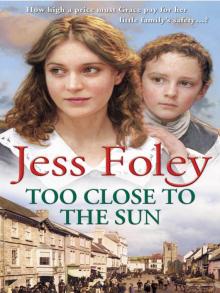 Too Close to the Sun
Too Close to the Sun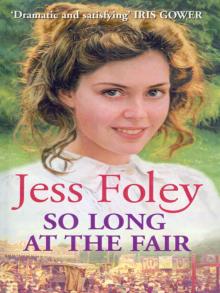 So Long At the Fair
So Long At the Fair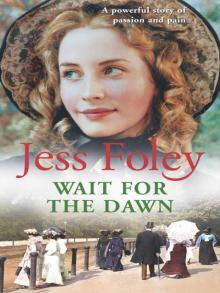 Wait For the Dawn
Wait For the Dawn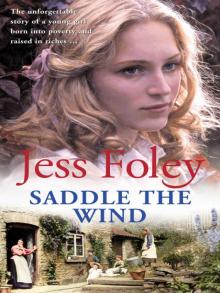 Saddle the Wind
Saddle the Wind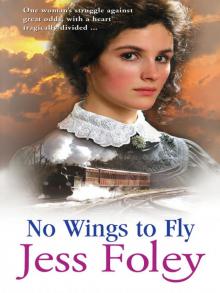 No Wings to Fly
No Wings to Fly